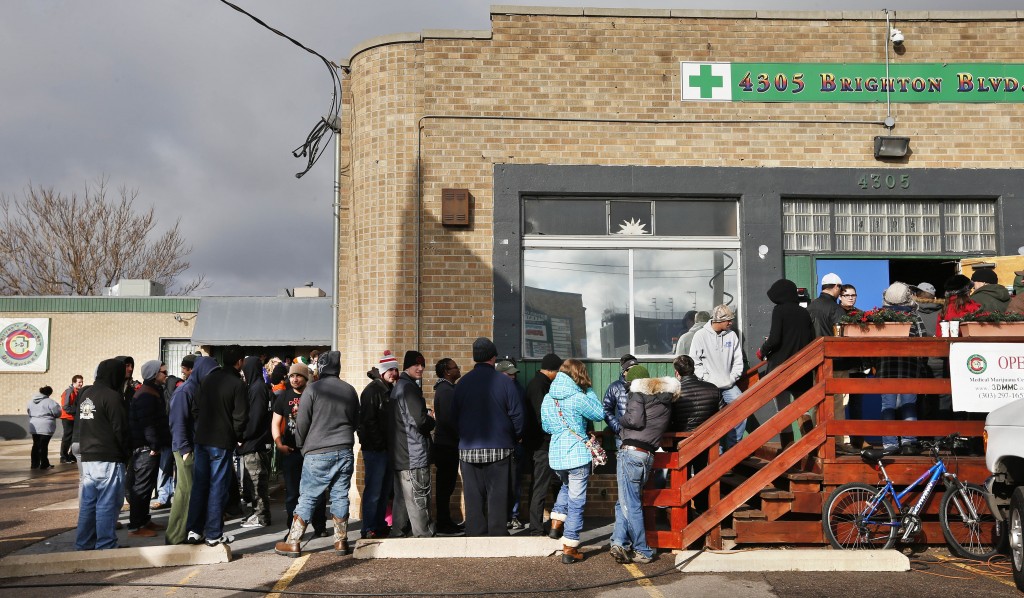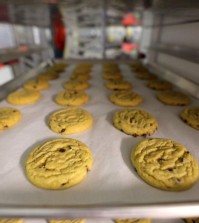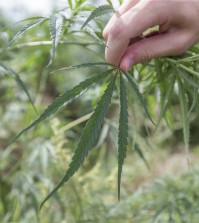- California Assembly OKs highest minimum wage in nation
- S. Korea unveils first graphic cigarette warnings
- US joins with South Korea, Japan in bid to deter North Korea
- LPGA golfer Chun In-gee finally back in action
- S. Korea won’t be top seed in final World Cup qualification round
- US men’s soccer misses 2nd straight Olympics
- US back on track in qualifying with 4-0 win over Guatemala
- High-intensity workout injuries spawn cottage industry
- CDC expands range of Zika mosquitoes into parts of Northeast
- Who knew? ‘The Walking Dead’ is helping families connect
Legal marijuana in U.S. a ‘culture shock’ for Koreans

Customers stand in line shortly after the opening of 3D Cannabis Center, which opened as a legal recreational retail outlet in Denver at 8am on Wednesday Jan. 1, 2014. Colorado began retail marijuana sales on Jan. 1, a day some are calling “Green Wednesday.” (AP Photo/Brennan Linsley)
By Jane Han
DALLAS ― Hwang Yon-sook, 47, a Colorado mom of a high schooler, was not happy when her son came home from school with leftover brownies ― not just plain brownies, but chocolate treats spiked with marijuana.
”I’m talking about marijuana, as in the drug. Yes, the drug,” Hwang said, still in disbelief that her son had such easy access to weed. ”My son won’t tell me exactly where and how he got the special brownie, but one thing I know is that he didn’t have to try that hard.”
Hwang is probably right.
In Colorado, the first state in the U.S. to begin selling recreational marijuana in January 2014, there are now at least three dozen retail shops that sell marijuana edibles, including brownies, cookies, gummy bears and chocolate candy bars.
Individuals must be 21 and older to buy, possess or use retail marijuana, but like alcohol, teens that want it somehow find a way to get their hands on it.
Following Colorado, Washington, a state with a large Korean population, became the second state to begin selling legal cannabis in early July, and Korean residents are not happy.
”Coming from Korea, we are very much educated to believe that marijuana is an illegal drug that should not be used. We’re used to thinking that’s it’s a bad thing,” says Janet Park, 32, of Seattle, ”so I was really surprised when I first found out that weed is going to be legal where I live. I’m living in a very different world.”
Park has a toddler girl so her child’s marijuana exposure isn’t an immediate concern, but she does fear that widespread drug usage may hurt people’s general quality of living.
”What about people driving under the influence? The smell of pot everywhere? The possibility of more people on the streets?” asks Park, as she raises questions over the consequences of legal cannabis. ”We’re all new to this territory so we won’t know until things happen.”
Despite uncertainties, more Americans today are for marijuana than they are against it.
A Gallup poll in October 2013 found that, for the first time, a clear majority of Americans (58 percent) said the drug should be legalized in the U.S. The latest finding showed a sharp difference compared to 1969, when Gallup first asked the question and only 12 percent favored legalizing marijuana.
Debate between advocates and opponents continues, but the general consensus is that legalization of both medicinal and recreational marijuana will expand across the country in years to come.
Only a few months have passed since legalization took effect, but Koreans living in the U.S., who tend to be conservative, seem to be noticing more negative changes so far.
”Two months after my family moved in to a new house, we found out our neighbor was growing pot in her backyard with the fan running 24 hours a day,” wrote one Korean resident of Colorado on a local Korean online forum.
”My family, including my two young children, had to smell pot all day and all night. It’s been so torturous that I listed the house for sale, but realtors tell me I’m out of luck as long as the marijuana garden is next door,” she added.
David Kim, an official of the Korean American Association of Washington, says although there are ”proven benefits for marijuana usage,” many Koreans don’t relate to and approve the drug legalization as much as Americans do.
”It’s a culture shock. No matter what advocates here say, for Koreans, marijuana has always been and probably always will be considered a bad drug,” he said.

















Sven
September 15, 2014 at 5:28 PM
need a place to grow? Contact these guys-> http://www.healersfarm.com
Marcine Cohen
September 15, 2014 at 6:21 PM
Tell them it’s ‘Ma’, what civilization, and, America, was founded, with: “Like, the oil and canvas paintings, in museums?” Right: the most nutritious foodsource, on Earth… “Rope, paper, textiles – same plant?” Yes: Cannabis (“canvas”) Sativa!